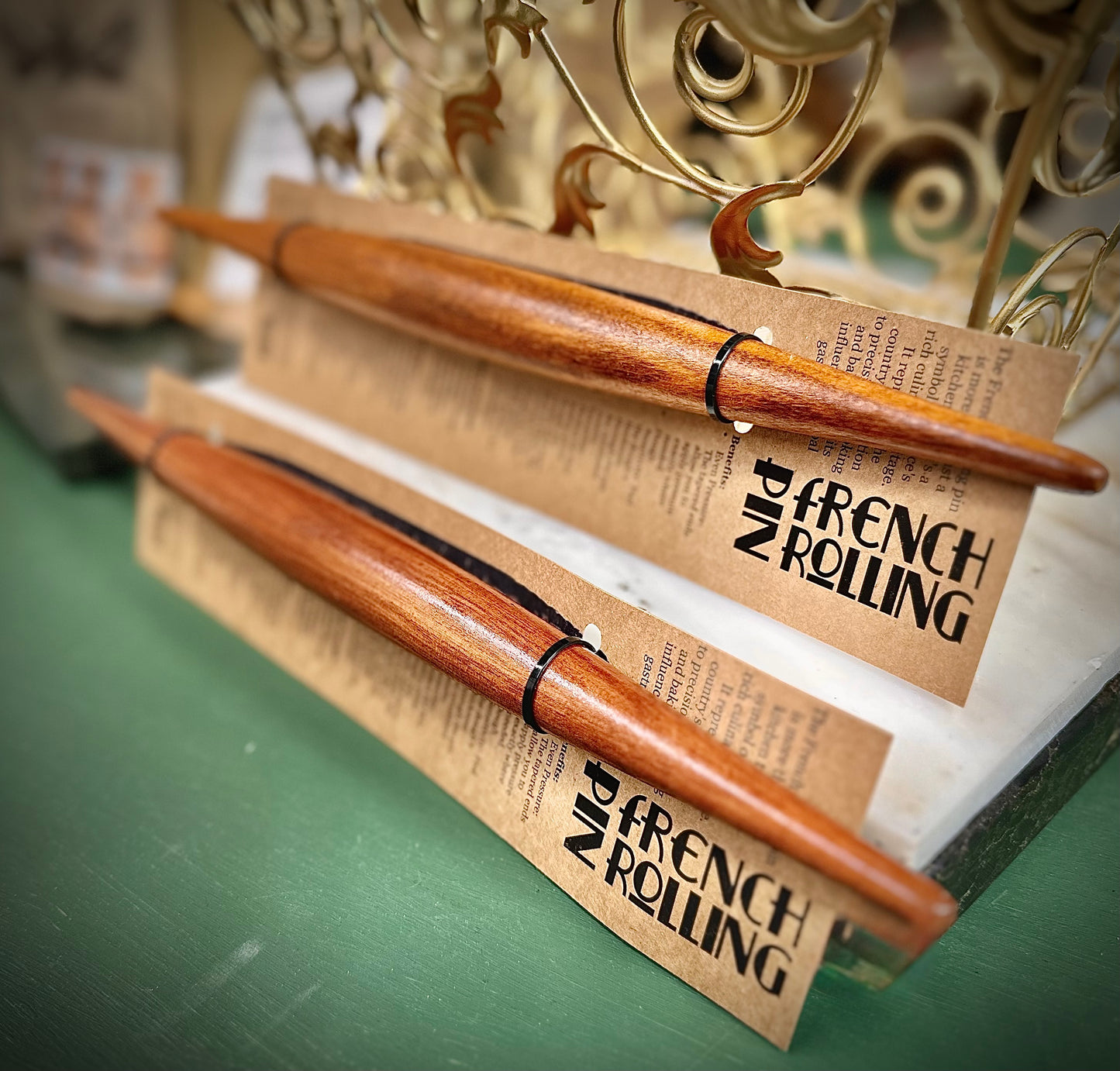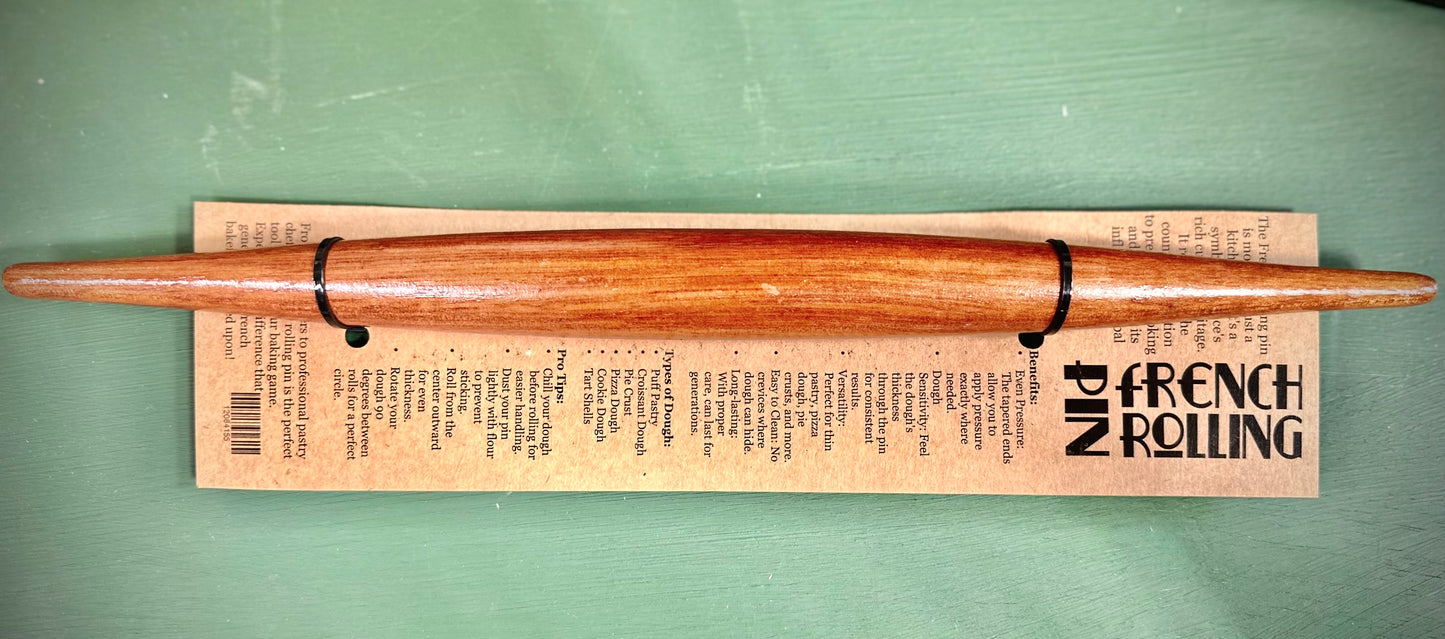The Art of French Baking: Precision in Your Hands
The Art of French Baking: Precision in Your Hands
The Art of French Baking: Precision in Your Hands
Introducing our elegant French rolling pin, a timeless tool that embodies centuries of baking tradition. This tapered, handle-less design, known as a "rouleau à pâtisserie" in French, has been a staple in European kitchens since the 18th century.
History:
The French rolling pin emerged during a time of culinary innovation in France. Its simple, elongated design was a response to the need for greater control and precision in pastry-making. Unlike the bulkier, handled pins common in other parts of Europe, this sleek tool allowed bakers to feel the dough directly, revolutionizing the art of pastry.
Ancient Origins:
The concept of rolling pins dates back to ancient civilizations. Cylindrical stones and pieces of wood were used to flatten dough as far back as 1,000 BCE in Etruscan and early Roman cultures.
Medieval Evolution:
By the Middle Ages, rolling pins became more refined. European bakers, particularly in France and Italy, began crafting specialized wooden tools for different types of pastry.
18th Century Revolution:
The French rolling pin as we know it today gained prominence in the 18th century. This period saw a revolution in French cuisine, with puff pastry and other delicate doughs becoming popular. The tapered design allowed for more precise control, essential for these intricate pastries.
Versailles Influence:
Legend has it that the tapered French rolling pin gained favor in the kitchens of Versailles during the reign of Louis XIV. The Sun King's love for elaborate pastries pushed royal bakers to refine their tools and techniques.
19th Century Standardization:
As French cuisine gained international renown in the 19th century, the French rolling pin became a standard tool in professional kitchens across Europe and beyond. Culinary schools like Le Cordon Bleu made it a part of every chef's essential kit.
American Adoption:
In the United States, the French rolling pin gained popularity in the early 20th century, introduced by European immigrants and championed by influential cooks like Julia Child, who praised its superiority for delicate pastry work.
Modern Craftsmanship:
Today, while mass-produced versions are available, many artisanal woodworkers in France still craft these rolling pins by hand, often using traditional techniques passed down through generations.
Cultural Significance:
The French rolling pin is more than just a kitchen tool; it's a symbol of France's rich culinary heritage. It represents the country's dedication to precision in cooking and baking, and its influence on global gastronomy.
Virtues of the Design:
• Superior Control: The tapered ends and lack of handles allow for nuanced pressure application.
• Even Rolling: The consistent surface ensures uniform dough thickness.
• Versatility: Ideal for delicate pastries, pie crusts, and even pizza dough.
• Sensory Feedback: Direct contact with the dough enhances the baker's ability to gauge thickness and texture.
• Easy Storage: The compact design takes up minimal space in your kitchen.
Specifications:
• Length: 13 inches
• Diameter: 1.5 inches at the center, tapering to 1 inch at the ends
• Material: Sustainably sourced hardwood
• Finish: Smooth, food-safe surface
Maintenance:
- Wipe clean with a damp cloth after use.
- Never soak in water or put in the dishwasher.
- Apply food-grade mineral oil monthly to prevent drying and cracking.
Perfect for both novice bakers and seasoned professionals, this French rolling pin will elevate your baking to new heights of precision and artistry.
Easy Home-Style French Croissants
- 3 cups all-purpose flour
- 1 1/2 tsp instant yeast
- 1 tsp salt
- 1 tbsp Orange Vanilla Sugar
- 1 cup cold milk
- 1 cup cold unsalted butter
- For egg wash - 1 egg beaten with 1 tbsp water
Mix flour, yeast, salt, and sugar in a bowl. Add milk, mix until dough forms. Knead briefly, shape into a ball. Refrigerate for 1 hour. Roll dough into a rectangle. Place thin slices of butter on 2/3 of the dough. Fold dough like a letter. Roll out and fold again. Chill for 30 minutes. Roll dough into a large rectangle. Cut into triangles. Roll each triangle from wide end to point, curve slightly. Place on baking sheet. Brush with egg wash. Let rise 1 hour. Bake at 375°F (190°C) for 15-20 minutes until golden.
Embrace the tradition of French baking excellence and unlock new levels of precision in your pastry-making. Order your French rolling pin today and experience the difference that quality craftsmanship can make in your baking!
Share
Couldn't load pickup availability





